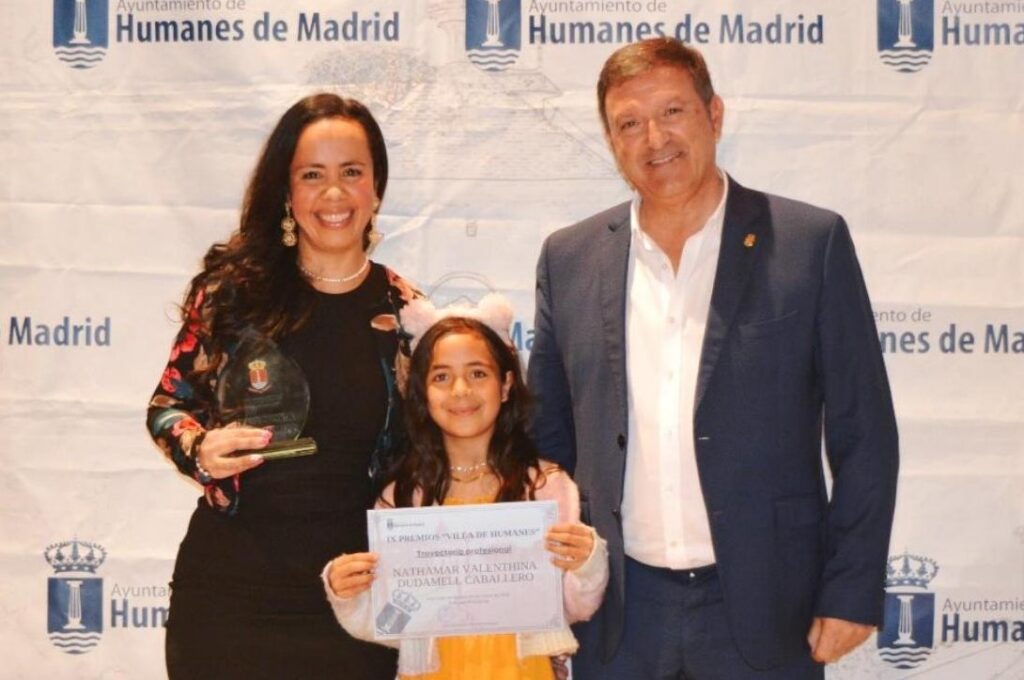When former IMDEA Materiales Institute researcher, Dr. Nathamar Dudamell received a call from the City Council of Humanes de Madrid, her home for the past 15 years, she initially expected the worst.
So, it was a particularly pleasant surprise when it turned out that the call had actually come from the nominating committee for the 9th edition of the Villa de Humanes Awards.
“The truth is when I got the call from Town Hall, my first thought was that it was going to be about an unpaid fine that might have gone unnoticed,” laughed Dudamell.
“But then they told me that I had been nominated for the Villa de Humanes awards in the Career Path category, I told them, ‘who, me!’ And well, yes it was true.”
“It was a big surprise for me. Above all, because I don’t work in Humanes, but they value that someone from the town has a professional trajectory like mine.”
Last Friday, Dudamell was on hand to receive the award in recognition of her career path that began at IMDEA Materials as a Research Assistant in 2008.
Since then the metallurgical and materials engineer has gone on to have an outstanding career in the aerospace and transport sectors, first at Airbus, then with Talgo, Aernova and, for the past five years, in the Tres Cantos-based technology business group GMV.
“My stay at IMDEA Materials was very nice because I really wanted to do my Ph.D., and I wanted to do it in something tangible, something that you can touch, something that is applicable,” recalls Dudamell.
“And when I found the Institute’s proposal, which was a Ph.D. in materials science and technology for a deformation application of magnesium alloys in the automotive sector, I didn’t hesitate.”
Dudamell was the first predoctoral student of IMDEA Materials Principal Investigator Dr. Teresa Pérez Prado. During almost 4 years at the Institute, she did her Ph.D. in the Study of the high strain rate behavior of magnesium alloys by mechanical, metallographic and textural analysis.
“At that time, it was very interesting because of little previous research in that field,” she says. “I would spend whole days with (Dr.) Teresa (Perez Prado), with a bunch of pictures on the table, trying to explain the physical phenomena we were seeing at the grain level.”
“We were working on something pioneering, something groundbreaking, and it’s true that it has come to have a big impact in that area.”
In her current position with GMV, Dudamell is head of the SPASS-SEM Hardware (Support in Engineering and HW Manufacturing) department, where she supports production and engineering for the defense, aeronautics, aerospace and transport sectors.
It is a role that spans a wide range of software and operating systems projects, from electronic control units for aeronautical cranes to the Galileo project, the European Union’s Global Navigation Satellite System (GNSS).
But more than a decade since leaving IMDEA Materials, Dudamell still considers the time she spent doing her Ph.D. as having been indispensable to her successful career in the private sector.
“I think when you do a Ph.D., you learn a set of soft skills that you can only learn in that environment,” she says.
“Obviously, you have a background in materials, you have a background in material behavior, you have a background in microscopy, and that of course helps you transfer that to another approach.”
“But I think the biggest legacy is really when you go into an industrial activity that doesn’t have much to do with what you’ve done before. It’s precisely that, the ability to adapt, the ability to be adaptable, the ability to be resolute, the ability to think outside the box, that makes one attractive to a company.”

